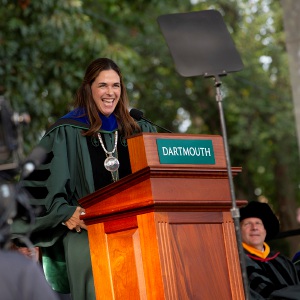David Zuckerman, John Rodgers win Vermont’s lieutenant governor primaries

Lt. Gov. David Zuckerman celebrates his election as the Democratic Party nominee in Burlington on Tuesday. VTDigger — Glenn Russell
| Published: 08-14-2024 3:08 PM |
Lt. Gov. David Zuckerman and former state legislator John Rodgers won the Democratic and Republican primaries, respectively, for Vermont’s second-highest office on Tuesday, setting the stage for a general election clash between two Statehouse veterans who do not fall neatly along party lines.
Zuckerman, a Hinesburg produce farmer who is seeking his fourth stint in the lieutenant governor’s office, overcame a challenge by Winooski Deputy Mayor Thomas Renner. With every town reporting results just before midnight, Zuckerman defeated Renner 56% to 37%, according to unofficial results from the Secretary of State’s Office.
Rodgers, who runs a construction business in Glover and previously served nearly two decades in the state Legislature, prevailed over Rutland accountant and former local GOP committee chair Gregory Thayer. The unofficial results showed Rodgers with 56% of the vote and Thayer with 35%.
Meanwhile, Zoraya Hightower — a former Burlington city councilor who works at an environmental justice nonprofit — won her uncontested bid for the Vermont Progressive Party’s lieutenant gubernatorial nomination, unofficial results showed.
That party’s chair had said previously, though, that Hightower and other statewide Progressive candidates would “probably not” continue onto the November ballot, adding that the Progs would endorse certain candidates after the primary, several of whom are historically “fusion” candidates, such as Zuckerman, who styles himself as a Progressive/Democrat.
“I’m feeling good — it certainly has been a real race,” Zuckerman said Tuesday night at a campaign watch party in Burlington’s South End, shortly after results were announced. “Thankfully, my track record with a lot of people counts for something.”
Zuckerman was the only statewide incumbent facing a primary challenge this year. In his campaign, he played up his experience presiding over the Vermont Senate as lieutenant governor (the job’s main responsibility), and before that serving in that chamber and in the Vermont House as a lawmaker.
Several voters said at the polls on Tuesday that they had had second thoughts about Zuckerman after reading recent reporting on a 2023 incident involving the lieutenant governor. As VTDigger reported last week, House Speaker Jill Krowinski, D-Burlington, issued verbal and written warnings to Zuckerman early that year after state legislators reported feeling uncomfortable when he offered them access to a supply of menstrual products.
Article continues after...
Yesterday's Most Read Articles
 Lebanon to close street, block parking to allow outdoor dining
Lebanon to close street, block parking to allow outdoor dining
 Hundreds of alumni sign letter urging Beilock, Dartmouth to make a stand for academic freedom
Hundreds of alumni sign letter urging Beilock, Dartmouth to make a stand for academic freedom
 Tree-clearing work near power lines causes Upper Valley outage
Tree-clearing work near power lines causes Upper Valley outage
 Outgoing Alice Peck Day CEO led hospital through growth and change
Outgoing Alice Peck Day CEO led hospital through growth and change
 Grantham superintendent resigning to become EMT amid rising political attacks on schools
Grantham superintendent resigning to become EMT amid rising political attacks on schools
Northfield resident Ben Sanders said the story was the topic of many conversations he had about Zuckerman. "I felt he's done a good job up until now," Sanders said. "But recent news gave me a lot to think about. Whether there was an overreaction or the right amount of reaction to what he did, regardless, it still makes me think more seriously about who we want representing us.”
Others, though, said they were excited to vote to reelect the lieutenant governor. Zuckerman “understands Vermonters” and “cares about the environment,” said Samantha Keyes, 27, of Middlebury.
Renner — who has only held office at the local level — had centered his identity as a gay Black man, emphasizing the importance of representation in state government. He said that he saw few differences between himself and Zuckerman over policy issues, though he also highlighted that he identified solely as a Democrat.
“Going against an incumbent is really difficult. I worked for an incumbent who was there for 30-plus years,” Renner said, referring to former U.S. Senator Patrick Leahy. Renner was speaking to supporters at a campaign party in downtown Winooski. “We ran a really great campaign, though,” Renner said.
In Zuckerman, Vermont’s Democratic voters once again backed a lieutenant governor candidate with a less stringent allegiance to their party. But GOP voters, in Rodgers, also backed a fairly unconventional Republican.
Rodgers served in the House and Senate as a Democrat, even running a write-in campaign as a Democrat for governor in 2018. But he announced his campaign for lieutenant governor earlier this year as a Republican, saying the state’s Democratic party no longer reflected his values and charging that its leadership was not looking after working class people.
He had also described himself as a moderate in comparison to Thayer, who is a vocal supporter of former President Donald Trump and who attended the Stop the Steal rally in Washington, D.C., that preceded the storming of the U.S. Capitol on Jan. 6, 2021.
“I think our message is being well received, and a lot of Vermonters are ready for change,” Rodgers said in an interview Tuesday night after results were announced. “And they feel like I'm the candidate to do it.”
Reached on the phone Tuesday night, Thayer — who also ran, unsuccessfully, for the GOP’s lieutenant governor nomination in 2022 — said he was disappointed in the results, but added that he is “not going away.”
“We got our message out there. We talked to, and represented, thousands of Vermonters,” Thayer said. “We’re going to keep working.”
Chloe Jad, Emma Malinak, Sarah Mearhoff and Theo Wells-Spackman contributed reporting.






 Dartmouth doctoral student back on campus after visa status was thrown into doubt
Dartmouth doctoral student back on campus after visa status was thrown into doubt
